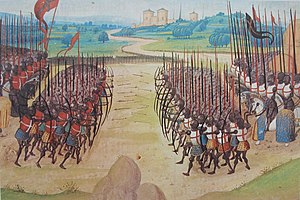Battle of Agincourt
| Battle of Agincourt | |||||||
|---|---|---|---|---|---|---|---|
| Part of the Hundred Years' War | |||||||
 The Battle of Agincourt, 15th-century miniature, Enguerrand de Monstrelet |
|||||||
|
|||||||
| Belligerents | |||||||
|
|
|
||||||
| Commanders and leaders | |||||||
| Strength | |||||||
| Modern estimates range from 6,000 to 9,000 (see Numbers at Agincourt.) About 5⁄6 longbowmen, 1⁄6 dismounted knights and men-at-arms in heavy armour. |
Modern estimates range from 12,000 (outnumbering the English 4–3). to 36,000 (outnumbering the English 6–1; see Numbers at Agincourt.) About 10,000 knights and men-at-arms (of which about 1,200 were mounted), unknown thousands of other infantry, crossbowmen and archers. |
||||||
| Casualties and losses | |||||||
| Around 600 dead, unknown wounded | 7,000–10,000 (mostly killed) and about 1,500 noble prisoners | ||||||
The Battle of Agincourt (/ˈæʒɪnkʊr/; in French, Azincourt French pronunciation: [azɛ̃kuʁ]) was a major English victory in the Hundred Years' War. The battle took place on Friday, 25 October 1415 (Saint Crispin's Day) in the County of Saint-Pol, Artois, some 40 km south of Calais (now Azincourt in northern France).Henry V's victory at Agincourt, against a numerically superior French army, crippled France and started a new period in the war during which Henry V married the French king's daughter, and their son, later Henry VI of England and Henry II of France, was made heir to the throne of France as well as of England.
Henry V led his troops into battle and participated in hand-to-hand fighting. The French king of the time, Charles VI, did not command the French army himself as he suffered from severe psychotic illnesses with moderate mental incapacitation. Instead, the French were commanded by Constable Charles d'Albret and various prominent French noblemen of the Armagnac party.
This battle is notable for the use of the English longbow in very large numbers, with English and Welsh archers forming most of Henry's army. The battle is the centrepiece of the play Henry V by William Shakespeare.
...
Wikipedia
